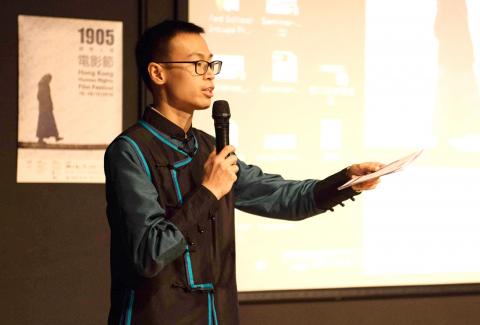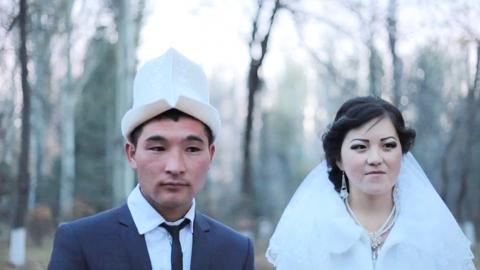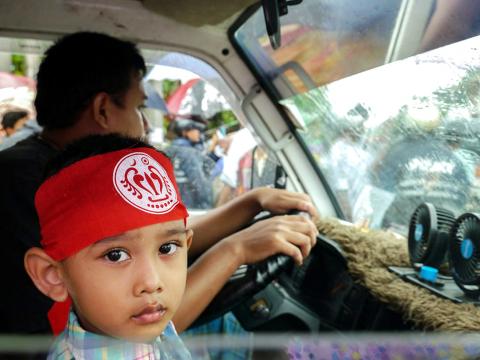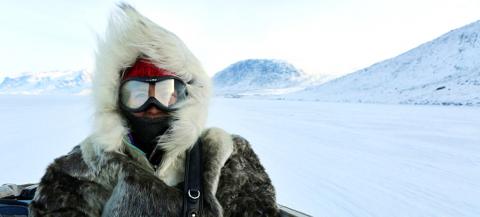Last month, the New York Times reported that Chinese activist Li Dan (李丹) had “relocated” his 1905 Hong Kong Human Rights Film Festival to Taiwan, with a smaller satellite festival in its original location.
Looking at the schedule, however, perhaps Li has changed his mind. The festival will indeed take place concurrently in both locations, but there are still significantly more offerings in Hong Kong than in Taiwan.
“It’s more like an expansion, because we can’t give up on Hong Kong,” Li says, noting that Taiwan’s freedom of speech allows for more opportunities for funding and exchanges. The festival will continue in Hong Kong, he says, to maintain his original purpose of exposing people there and China to human rights issues.

Photo courtesy of 1905 Human Rights Film Festival
In collaboration with the Formosa Festival of International Filmmakers (福爾摩沙國際電影節) and the Taiwan International Queer Film Festival (台灣國際酷兒影展), the renamed 1905 Human Rights Film Festival kicks off its Taiwan program on Saturday with 15 feature and documentary productions, shown mostly at smaller venues such as coffee shops, bookstores and universities.
ACTIVISM
Li has long been on the frontlines of Chinese activism, starting from his involvement in HIV prevention in 2003, for which he won the Reebok Human Rights Award in 2006 for non-violent activists under 30 years. In recent years, he’s turned his focus toward cultural activities, such as opening a bookstore in Hong Kong and establishing the China Women’s Film Festival.

Photo courtesy of 1905 Human
“You might think that you’ve made a significant difference as an activist fighting directly against the government. But when you count the number of people involved in human rights in China, both back then and today, there’s just a few thousand at most. For real change, we need strong civic participation. How do we get the public involved?” Li says.
Li says that although the festival pushes the envelope, it’s difficult to shut down a film festival. However, there’s no way that a human rights program would be allowed in China. And with Beijing tightening its control over Hong Kong, Li felt that opportunities for growth would be limited.
“It’s not to the point in Hong Kong where we can’t talk about anything, but it’s tough as far as seeking resources,” he says.

Photo courtesy of 1905 Human Rights Film Festival
SELF-CENSORSHIP
Li says he could seek funding from foreign embassies in China, but their Hong Kong counterparts have a much smaller budget for such activities. Hong Kong corporations that want to stay on China’s good side will avoid the festival due to its association with human rights, which greatly reduces the number of potential investors.
Even filmmakers are reluctant to participate or help out in fear of repercussions by the Chinese government, Li says.

Photo courtesy of 1905 Human Rights Film Festival
“People often think that we’re spies [coming from China],” he adds. “They think it’s strange that we’re able to put together such a film festival in Hong Kong without the government interfering. But we know how to find the cracks in the steel plate where we can operate.”
Li says the key is to keep a low profile, to remain outside of the “top 10.”
“Also, insist that you’re not doing anything new. When they question me, I just tell them, hey, Hong Kong already has the [Hong Kong Human Rights Documentary Film Festival],” he says.

Photo courtesy of 1905 Human Rights Film Festival
The main goal in establishing a presence in Taiwan, in addition to resources, is to establish a platform where filmmakers from the region and beyond can freely interact and exchange ideas.
“Taiwan already has a lot of film festivals, we don’t need to join in on the fun,” Li says. “We are looking for a long-term base where we can have workshops, collaborations, discussions, seminars, bring international filmmakers here and Taiwanese overseas.”

Taiwan has next to no political engagement in Myanmar, either with the ruling military junta nor the dozens of armed groups who’ve in the last five years taken over around two-thirds of the nation’s territory in a sprawling, patchwork civil war. But early last month, the leader of one relatively minor Burmese revolutionary faction, General Nerdah Bomya, who is also an alleged war criminal, made a low key visit to Taipei, where he met with a member of President William Lai’s (賴清德) staff, a retired Taiwanese military official and several academics. “I feel like Taiwan is a good example of

March 2 to March 8 Gunfire rang out along the shore of the frontline island of Lieyu (烈嶼) on a foggy afternoon on March 7, 1987. By the time it was over, about 20 unarmed Vietnamese refugees — men, women, elderly and children — were dead. They were hastily buried, followed by decades of silence. Months later, opposition politicians and journalists tried to uncover what had happened, but conflicting accounts only deepened the confusion. One version suggested that government troops had mistakenly killed their own operatives attempting to return home from Vietnam. The military maintained that the

Before the last section of the round-the-island railway was electrified, one old blue train still chugged back and forth between Pingtung County’s Fangliao (枋寮) and Taitung (台東) stations once a day. It was so slow, was so hot (it had no air conditioning) and covered such a short distance, that the low fare still failed to attract many riders. This relic of the past was finally retired when the South Link Line was fully electrified on Dec. 23, 2020. A wave of nostalgia surrounded the termination of the Ordinary Train service, as these train carriages had been in use for decades

Lori Sepich smoked for years and sometimes skipped taking her blood pressure medicine. But she never thought she’d have a heart attack. The possibility “just wasn’t registering with me,” said the 64-year-old from Memphis, Tennessee, who suffered two of them 13 years apart. She’s far from alone. More than 60 million women in the US live with cardiovascular disease, which includes heart disease as well as stroke, heart failure and atrial fibrillation. And despite the myth that heart attacks mostly strike men, women are vulnerable too. Overall in the US, 1 in 5 women dies of cardiovascular disease each year, 37,000 of them